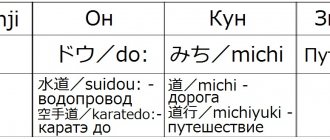Basically, the Japanese use first and last names with nominal suffixes. There are some exceptions here, but more on that later.
In general, the topic of nominal suffixes is huge and there are a lot of nuances that are better to learn in life, rather than in theory. However, in this article I will try to theoretically break down some points and bring a little clarity to this topic.
We won’t go into everything, we’ll go over the top so as not to drag out the article.
Let's start with the most popular nominal suffixes: san, kun and chan .
Suffix "San"
For example, Yamada-san. The suffix “San” is a neutral polite style. It can be compared to some extent with a conversation on “you” .
That is, in essence, the suffix “ San ” is used by juniors in relation to elders; when speaking on equal terms, in official address, whether it is a stranger or a work colleague, they usually use “ San ”.
However, it is worth clarifying here that when using “ San ”, this may not always mean official communication. But let's hold that and move on to the " Tian " suffix.
What is "chan"
If you are in doubt about the meaning of a word, we advise you to turn to explanatory dictionaries for help. This is how they answer the question: “What is a vat?”
Firstly, a vat is a vessel. Wooden or metal.
You may be interested in: Sodium monofluorophosphate: harm or benefit
Secondly, this is the name given to a rectangular brick or concrete tank.
Thirdly, Chan is a fairly common surname in China and Vietnam.
Let's look at a few examples of the use of this word.
- The Chiang Dynasty seized the throne a long time ago.
- The vat is too heavy and bulky for such a fragile girl to lift.
- Don't clog the ash vat!
Suffix "Tian"
I see errors quite often with this suffix. Most beginners and some textbooks believe that the suffix “Kun” is used in relation to boys, and “chan” is used in relation to girls. Of course this is not true. I honestly admit, I don’t know where it came from, maybe it was like this once or it’s a usage error, I don’t know what I don’t know.
However, if we talk about the Japanese language at the present time, then “ Tian ” in real life is similar to our diminutive suffix . That is, when you say, for example, Yoko- chan - you essentially say Yokochka , or to make it easier in Russian you say Masha - Mashenka . It is used in much the same way as in Russian, that is, in informal speech, and it is a gross misconception to think that “Tyan” is used exclusively for girls, although for some reason many people think so.
So, for example, you can hear when a girl calls a guy Akira- chan and this does not mean that Akira has become a girl.
This is just a diminutive of Akirochka. Or if grandfather is called “Oji-chan”, this will not make him a woman.
But there is one “BUT” : of course, a guy won’t call a guy with the suffix “chan”, because... it will really be strange, although there are such cases. Well, our two guys don’t talk in a diminutive style among themselves.
Meaning of the word san
Examples of the use of the word san in literature.
Next came the noble augurs, dressed in togas with purple stripes, and in their hands they held the symbol of the priestly rank - a pointed staff.
“Oh, this anachronistic skirt,” muttered the lanky priest at the door, still a victim of prejudices that demand that a person of clergy ride only a tricycle and only wear black.
Exhausted by everything she had experienced, she allowed herself to bow her head on the broad chest of the Anglo-Saxon and did not even try to pull herself together, although her gender and rank demanded it.
And the carriage with Rasputin was already turning towards Inzhenernaya - to the house of State Secretary Taneyev, the father of Anyutka Vyrubova and Sana Pistolkors.
Deciding then to subjugate the Florentines, he marched on Florence through Perugia and Arezzo and stationed his army at the monastery of San Salvi, one mile from the city.
Instead, the rector of the Lampatherine church, Kinok, is appointed to the archbishopric and is thus elevated to a higher clergy.
The office of archpastor commands us to guard the shrines of the faith; the conscience of a Christian cannot remain silent in the face of untruth, deceit and evil that disfigure our lives.
Refugee convoys were passing by the train at a trot to the north, towards the crossing of the San.
Pedro to be deprived of his office and benefits, to be removed from the episcopal rank and to return to the primitive state of a layman.
Acting strictly according to Krymov’s instructions, San Sanych came to the meeting with the beau monde completely drunk.
David and Bonyak knocked the Ugric horsemen into one heap, like a falcon knocking down a jackdaw, and in this confusion, not discerning from which side the enemy was attacking, the Ugrians fled, and many of them drowned in Vagra and Sana.
Beatriz Henriques y Braganza, ordained Beatriz de San Domingo, was the only daughter of the Duke of Castel Rodriguez, a wealthy and influential Spanish grandee and knight of the Order of the Golden Fleece.
These were the last words of Doña Beatriz Henriques y Braganza, in the monastic life of Beatriz de San Domingo, and she soon died.
Such a serious man, in ecclesiastical rank, as Abbot Busoni, would not allow himself such a joke, but you have not read everything yet, your Excellency.
It has now become clear that the Bushmen of the San tribe undertook risky treks through the vast expanses of the desert, covering a distance of about one hundred and fifty kilometers to the Atlantic coast and, returning home, imprinted on stone what they saw during their travels.
Source: Maxim Moshkov library
Suffix "Kun"
" Kun " is less formal and a little more "friendly". It is also a mistake to believe that Kun is used exclusively for men. Yes, in practice, it mostly turns out this way, but it is not 100% always the case. Those. It’s fair to use “ Kun” to refer to a girl, too, if you don’t want to substitute the suffix “ Tian ,” i.e. when the diminutive form is not entirely appropriate. Kun being used for girls .
Those. If you show graphically the rank of politeness, then you can place Kun San ”, but above “ Tian ”.
And these 3 suffixes should be enough for the first couple of years of study. And then come the following suffixes.
“No need for Chan!”
Krylov’s fable “The Fox and the Grapes” actually perfectly reflects the essence of the statement about the uselessness and uselessness of girls. Infantile guys who are not popular with the fair sex can still be good friends. Although in practice they consider themselves deeply offended, used and curse the friend zone. Of course, the girls are blamed.
In order to somehow justify the absence of a couple in their own eyes, they derive the principle “the grapes are green.” Kun sounds proud, but chans are not needed because they are mean, selfish, greedy and stupid. Getting involved with these “subhumans” is simply beneath human dignity.
However, having sex with a man is still reprehensible. This is the paradox that justifies loneliness and obsession with computer games.
Suffix "Herself"
The suffix “Sama” has the highest position in our hierarchy.
It’s hard to translate literally, but essentially as “honorable.” It is quite rare in spoken Japanese, but it does occur. For example, this is how the service staff may address you when they ask 何名様ですか “Nan mei sama deska” - “table for how many people”? Not San, but herself. Or when you are waiting and they read you from the list, for example: 山田様はいらっしゃいますか “Yamada-sama wa irasshaimaska?” That is, we often use the nominal suffix “Sama” in the conversation of service personnel.
Just like with us, Sama can be used as a joke, this is comparable when we say “Sorry, sir” or something similar, when we deliberately raise a person’s rank as a joke.
If we are not talking about colloquial language, then “sama” is used quite often. For example, in letters to the recipient they use Sama.
Features of application
What does “kun” mean and how to use this word correctly? First of all, you should not take slang terms seriously. All kinds of subcultures are a temporary phenomenon that sooner or later loses relevance.
Japanese nominal suffixes can be used while being careful to adhere to linguistic rules. Sometimes this helps to find a common language with other people and successfully diversify your vocabulary.
The easiest way is to add a friend's name or nickname. For example: “And Vasya-kun believes that skipping classes is a sin.” In this case, the moralizing statement takes on a mocking intonation, and if it is known about the mentioned Vasya that he is an inveterate truant, the phrase resembles a local meme.
Suffix "Sensei"
Sensei, literally “born before” - this is both a word and a nominal suffix, can be used with a name in those cases when you are addressing a teacher, professor and everyone who is in the subject of education, as well as when addressing a doctor, lawyer, politician , scientist, etc. Those. we can characterize this as certain socially important social figures. Rather, “Sensei” denotes a certain status rather than your attitude towards a person.
In my opinion, the main part of the suffixes is over, now comes the part for the most inquisitive minds who want to know more.
Start
In the recent past, not everyone had computers, and many users only dreamed of unlimited high-speed Internet.
Fortunately, now everything has changed, and no one will be surprised by numerous electronic gadgets and fast access to the Internet. Gradually, the Internet from a source of knowledge, entertainment and a method of communication turned into a kind of world within a world, in which various and usually short-lived subcultures, myths, legends and slang arose. As often happens in any society, including virtual ones, people always try to divide themselves into groups. On the Internet, this usually happens based on interests, and before the massive spread of social networks, various forums and other thematic platforms were very popular. Gradually, they developed their own slang, which was modified or distorted foreign words. And one of these words is kun. So what is kun, where did this word come from and what does it mean? We'll figure this out.
Suffix "Senpai"
“Senpai” is someone who is “senior” in a particular area. For example, for a 1st grade high school student, the senpai will be a 2nd grade high school student, and for a 2nd grade high school student, the 1st grade student will be Kohai.
We can say that they represent both simple words and nominal suffixes, just like Sensei. Those. they can also be used with names, such as Tanaka-senpai. Or you have been working for the company for 2 years, and another person has been working for 5 years. Who do you think he is for you? Right! Senpai! And for him you are Kohai.
To avoid confusion between Senpai and Kohai, use literal translation and mnemonics. Senpai is “comrade in front”, Kohai is “comrade behind”, and in the distance stands Sensei – “born before”.
Those. We imagine a graph where you stand and in the distance stands the Sensei who was born before you, the kanji Sen just hints that they came before you. Also, ahead of you is Senpai. And Kohai is behind you, as indicated by the kanji “after”.
“No need for kun!”
This is a mirror image of the previous statement, which is partly based on feminism. First of all, this is a symmetrical answer in the style of “it didn’t hurt as much as I wanted.”
Of course, feminists do not call for doing without men altogether; fundamental biology cannot be bypassed. However, this is a quite significant statement, which concerns the typical portrait of the average “kun”. The interpretation in this case can be more specific: in the form on which the patriarchal system insists, men are really not needed.
A modern woman prefers to see next to her a non-infantile male who is unable to independently provide for her basic household needs. She also doesn’t want to know those who are capable of dying of hunger in front of a full refrigerator, since the wife did not serve and put a plate in front of her nose.
Equality between marriage partners makes it possible to build a more progressive family model, where neither party sacrifices itself. In this case, there are no standard grievances and complaints.
Suffix "Senshu"
"Senshu" is not only the word for "athlete", but it is also a suffix used for famous athletes.
PS You expected that there would be more nominal suffixes here, but I thought about it and realized that there is nothing more to talk about, so if I remember something, I will definitely update the article.
Now let's talk about when suffixes are not used , because this also happens.
Suffixes do not need to be used in relation to family members when, for example, you are talking to someone.
Also, there is no particular need to use a suffix when addressing by name, because Usually in Japan this indicates a fairly close relationship to the person, so why the suffix? Those. when the relationship with a person is close enough, suffixes are not needed. On the other hand, there are so many nuances that even within the family circle they can use nominal suffixes by name.
Etymology
It goes back to the Old Russian “san” meaning “san”. The latter is found in the works of Cyril of Turov, a 12th-century Orthodox theologian and bishop. And also in the Laurentian Chronicle, one of the oldest in Rus'. It received its name from the Russian Orthodox monk Lavrentiy, a Suzdal monk. The year the chronicle was created is 1377.
Another word “san” is directly related to the Old Church Slavonic noun “san” and the adjective “sanovit” - “having a high rank.” They are found in the Supral Chronicle, a collection of texts from the first half of the 16th century, originating from the Supral Monastery (present-day territory of Poland). Most of its texts are extracts from the Novgorod Chronicles, which date back to the Pskov arch of the second half of the 15th century.
Since the noun “san” is not widespread in Slavic languages, etymologists come to the conclusion that it was borrowed from the Danube-Bulgar language. Linguists compare it with:
- Turkish san – “rank”, “title”, “honor”, “respect”;
- Chagatai and Kipchak san – “san”, “glory”, “large number”;
- Northern Turkic sanamak - “to appreciate”.
In Dahl's dictionary
m. high rank or title, noble position, granted dignity, honor. The rank of sovereign, minister, governor, bishop. By rank and honor. Such is the rank, such is the honor. By rank and honor. | Star. stature, posture, height. He was of average age and rank. dignitary, dignitary, -nitsa, high rank, nobleman. The nobleman has all the dignitary receptions. Dignified, dignified, handsome, prominent, tall and stately. | A person of noble birth, in general, who has high-ranking, noble ancestors. Rank, status, quality, sometimes property according to adj. dignitary cf. collect all the dignitaries together and in general. Sanity, the same, but more. about externals, majestic techniques. Lover of dignity, lover of dignity, thirsting for dignity, honor, nobility.
In Vasmer Max's dictionary
genus. p. -a, dignitary, posture, poise, other Russian. san "san" (Laurentian letop., Kirill Turovsk.), Old Slav. san ἀξίωμα, άρχή (Supr.), rank άξιωματικός (Supr.). Star. based on -u. Due to the insignificant distribution in Slavic, probably borrowed. from Danube-Bulg., cf. Tur., Chagat., Kypch. san “large number, rank, glory”, Northern Turkic. sanamak “to appreciate”; see Mi. EW 288; TEl. I, 240; 2, 151; Melioransky, IORYAS 10, 4, 127; Mladenov 569; RES 1, 50; Brückner, ZfslPh 4, 213. On the other hand, *sanъ is considered related to the Old Indian. sanu Wed. R. “top, height, edge”, creative. snúnā, deferred snoḥ; see Meillet, Ét. 243; Brugman, Grdr. 2, 1, 182; Bernecker, AfslPh 38, 263; Trautman, BSW 250; Convert II, 250. It does not seem more likely to be compared with other Indian. san- “to deserve”, Avest. han- “to deserve, to win” (Mazenauer, LF 19, 245 et seq.) or with Avest. spānah- “holiness”, contrary to Ilyinsky (IORYAS 23, 2, 211 et seq.); regarding this, see Saint.










